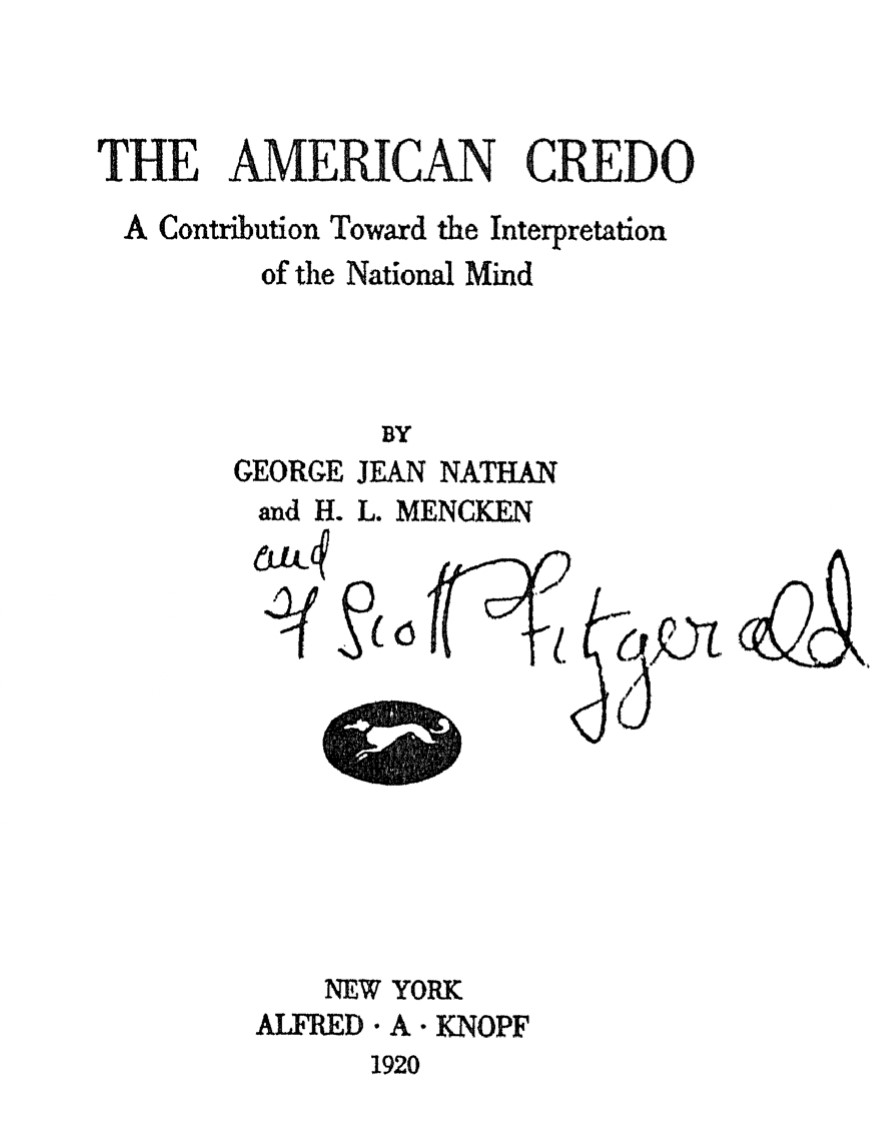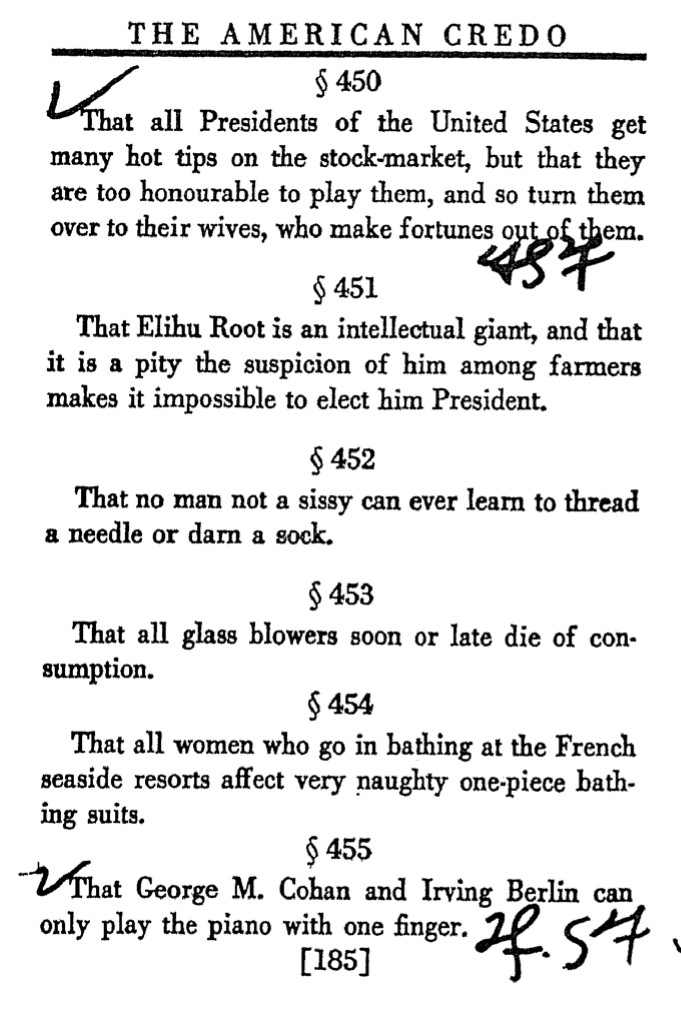
F. Scott Fitzgerald’s Contributions to The American Credo
by James L. W. West III
A recent discovery at Princeton University Library has brought to light some minor, but hitherto unknown, published items by F. Scott Fitzgerald. Fitzgerald’s personal copy of the H. L. Mencken/George Jean Nathan-authored book The American Credo A Contribution Toward the Interpretation of the National Mind (New York: Knopf, 1920) contains markings that establish Fitzgerald as a contributor to the volume.
Fitzgerald’s copy of the first edition, first printing, of The American Credo is among the rare books collections at Princeton (catalogue number Ex 1098.6695.11, copy 2)[1]. Nathan gave this particular copy to Fitzgerald: on the recto of the front free endpaper is Nathan’s inscription “To my good friends | Zelda + Scott | From their’s | George Jean Nathan—.”[2]
Figure 1. The title page of Fitzgerald’s copy of The American Credo. Reproduced with the permission of Alfred A. Knopf, Inc., and Harold Ober Associates, Inc. Princeton University Library.
The American Credo was a two-part effort. Mencken wrote the 96-page preface, and Nathan put together the actual “Credo”—a numbered collection of 488 quips, sayings, and witticisms, all of which poke fun at the cherished beliefs of the American mind[3]. Fitzgerald, it appears, contributed twelve items to Nathan’s Credo section, and on the basis of these contributions, considered himself as part-author of the book. On the title page of his copy, he has in fact pencilled his name in as one of the authors. (See Figure 1.) And in the text of the book, Fitzgerald has checked and initialed the items he contributed. (See Figure 2.) These are Fitzgerald’s contributions:
22
That all male negroes can sing.
51
That George Bernard Shaw doesn’t really believe anything he writes.
193
That whenever a vaudeville comedian quotes a familiar commercial slogan, such as “His Master’s Voice,” or “Eventually, why not now?”, he is paid $50 a performance for doing so.
199
That all men named Clarence, Claude or Percy are sissies.
248
That a man of fifty-five is always more experienced than a man of thirty-five.
262
That John D. Rockefeller would give his whole fortune for a digestion good enough to digest a cruller.
429
That all the schoolboys in Boston have bulged brows, wear large spectacles and can read Greek.
433
That all the cheaper brands of cigarettes are sophisticated with drugs, and in time cause those who smoke them to get softening of the brain.
442
That lighting three cigarettes with one match will bring some terrible calamity upon one or other of the three smokers.
449
That all the great writers of the world now use typewriters.
450
That all Presidents of the United States get many hot tips on the stock-market, but that they are too honourable to play them, and so turn them over to their wives, who make fortunes out of them.
455
That George M. Cohan and Irving Berlin can only play the piano with one finger.
Figure 2. Page 185 from Fitzgerald's copy of The American Credo. Reproduced with the permission of Alfred A. Knopf, Inc., and Harold Ober Associates, Inc. Princeton University Library.
Fitzgerald was apparently not the only outside contributor to The American Credo. On 25 November 1919, Mencken wrote to Louis Untermeyer: “Your contributions to the main Credo reach me just too late, dammit. I passed the page proofs a week ago.”[4] It is likely, then, that other members of the Smart Set circle besides Fitzgerald were contributors to the book.
Fitzgerald’s twelve contributions have an interesting subsequent textual history. In 1921, Mencken and Nathan issued a “Revised and Enlarged Edition” of The American Credo. For the new “Edition,” 381 freshly typeset items were added to the end of the Credo section on new pages 191-266, but the first 190 pages of the book were merely reprinted, with some revisions, from the original 1920 plates. Spot collation of the first 190 pages on the Lindstrand Comparator reveals plate variants both in Mencken’s preface (at 73.14-19, 83.6, and 91.1-2) and in Nathan’s Credo (at 135.10, 169.6, and 173.2-4). No plate variants, however, affect Fitzgerald’s contributions to the Credo. Six years later, Nathan published The New American Credo (New York: Knopf, 1927). For this volume, Nathan dropped Mencken's preface and published—in a true new typesetting—a revised and enlarged edition of the Credo section. All twelve of Fitzgerald’s contributions were retained in the 1927 volume, but with some textual alterations. The twelve items were re-numbered as follows:
1920 { 1927
22 [89
51 [135
193 [319
199 [314
248 [386
262 [45
429 [656
433 [660
442 [669
449 [676
450 [678
455 [685
Minor accidental changes appear in items 319 and 678 of the 1927 edition. As for substantives, the word “other” in 1920 item 442 is changed to “another” in 1927 item 669. And 1920 item 262—which read “That John D. Rockefeller would give his whole fortune for a digestion good enough to digest a cruller.”—was altered to item 45 of the 1927 edition: “That John D. Rockefeller would gladly give his entire fortune to be able to eat an eskimo pie.”
Notes
[1] I am grateful to Princeton University Library, as owners of Fitzgerald's copy of The American Credo, for permission to publish these findings. I also thank Virginia Polytechnic Institute and State University for a research grant which enabled me to visit the Fitzgerald Archive at Princeton.
[2] Published with the permission of Julie Haydon Nathan (Mrs. George Jean Nathan). There is, in addition, a letter from Mencken to Fitzgerald attached to the front paste-down endpaper of the book. Mencken’s letter apparently concerns a manuscript written by an unidentified author. Fitzgerald sent the manuscript to Mencken in hopes that Mencken could interest his own publisher, Knopf, in accepting it.
[3] See H. L. M. The Mencken Bibliography, compiled by Betty Adler, with the assistance of Jane Wilhelm (Baltimore: Johns Hopkins Press, 1961), p. 25.
[4] Letters of H. L. Mencken, ed. Guy J. Forgue (New York: Knopf, 1961), p. an. Forgue misdates the letter as “November 25th [1920].” (Mencken often omitted the year from dates on his letters.) Forgue apparently dates the letter 1920 on the basis of Mencken’s mention in the letter of two books—Untermeyer’s The New Adam and Floyd Dell’s Moon-Calf—both released in 1920. Rut Mencken, as a critic and reviewer, most likely read these two books late in 1919 in some pre-publication form. In any case, Mencken’s statement “I passed the page proofs [of The American Credo] a week ago” clearly belongs in November 1919, four months before official publication of The American Credo, and not in November 1920 when the book had already been on the market for eight months. The American Credo was officially published in mid-March 1920. See Publishers' Weekly, XCVII (13 March 1920), 817.
Published in Princeton Univercity Library Chronicle magazine (Volume XXXIV • Autumn 1972 • No. 1).

